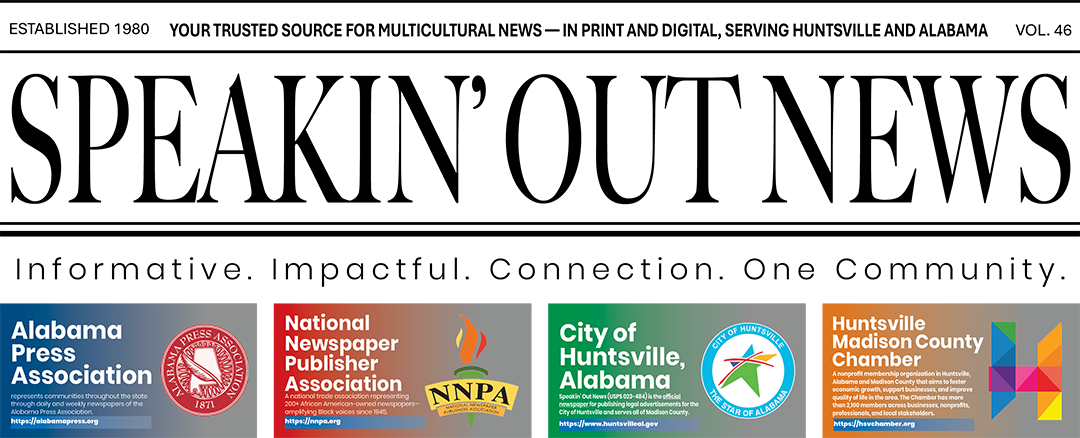SPEAKIN’ OUT NEWS

HUNTSVILLE — In a meeting that showcased Huntsville’s accelerating transformation, the City Council advanced several major rezoning, infrastructure, and financial initiatives Thursday night, November 20. Council President Jennie Robinson presided over a detailed and forward-looking session that reaffirmed Huntsville’s position as one of the fastest-growing cities in the Southeast — and one committed to managing that growth with strategic planning and financial discipline.
Zoning Proposals Lay Groundwork for Residential and Commercial Expansion
The meeting opened with a series of public hearings led by Planning and Zoning Manager Thomas Nunez, who walked the council through several key rezoning items shaping Huntsville’s future development patterns.
Nunez first addressed the zoning of 14.62 acres east of Greenbrier Road and north of Interstate 565, recently annexed into the city. The proposal would designate the land Highway Business C4 and Commercial Industrial Park — paving the way for commercial and industrial opportunities in a corridor increasingly defined by logistics, advanced manufacturing, and large-scale corporate growth. With no public comment, the council moved swiftly to approve the measure.
He next detailed a 25.14-acre rezoning west of North Memorial Parkway and south of Hollow Road. The land would shift from Residence 1B and Highway Business C4 to Residence 2 and Highway Business C4. Notably, the developers voluntarily proposed plat restrictions to protect the Parkway frontage from lower-quality uses, such as auto sales, auto repair, standalone parking lots, bus depots, and certain multifamily formats. These restrictions, Nunez said, were designed to preserve the character, value, and long-term viability of the Parkway corridor as Huntsville continues to densify. The council approved the rezoning unanimously.
The council also voted to set a December 18 public hearing for the rezoning of 380.93 acres along Alabama Highway 20 and I-65. If approved, the shift to a Planned Development Housing District would open the door to one of the region’s following major large-scale housing communities.
Hamilton Highlights Interagency Coordination and Major Capital Projects
Following the zoning agenda, City Administrator John Hamilton delivered updates on Huntsville’s formal partnerships with federal and state law enforcement agencies. He emphasized that these longstanding collaborations — including FBI task forces, Homeland Security Investigations, and the Tennessee Valley Regional Computer Forensics Lab — allow Huntsville to proactively address issues ranging from gun violence to child exploitation, while maintaining complete independence from controversial programs like 287(g).
Hamilton then presented two major agreements tied to the new Orion Amphitheater parking deck, a project poised to support the rapidly expanding MidCity entertainment district. The engineering contract and architectural contract — handled by AMERI Engineering Corporation and Chapman & Sisson Architects, respectively — will lay the groundwork for a large structured parking facility directly across from the Orion.
He clarified that the deck will be city-owned and city-managed, ensuring any parking revenue supports public operations rather than private partners. Hamilton also explained that state law determines architectural fees as a percentage of construction cost, accounting for the nearly $1 million design price. Both contracts passed easily.
Hamilton also presented a key modification to the design agreement for HVAC upgrades at the Municipal Justice Public Safety Complex. Consolidating all phases into a single coordinated construction effort, he said, will ensure uninterrupted court operations and reduce long-term expenses. The council approved the modification unanimously.
Smith Reports Strong Financial Position Supporting Growth
Next, Penny L. Smith, CPA, CGFM, Finance Director, delivered a comprehensive economic and financial report underscoring the city’s remarkable fiscal health — a foundation that continues to support Huntsville’s aggressive development agenda.
Smith noted that despite national economic uncertainty, Huntsville closed its fiscal year with revenues up 2.3% and expenditures 5% under budget, generating an impressive $20 million surplus in the general fund. Sales tax collections, Use Tax, and Simplified Sellers Use Tax (SSUT) all performed strongly, with SSUT up 12% year-over-year, reflecting Huntsville’s growing consumer base and rise in online commerce.
Property tax revenues also exceeded expectations, lodging tax revenues ended the year above budget, and the city’s expenditures remained tightly controlled. Smith cautioned that inflationary pressures will continue to be monitored, but reaffirmed that Huntsville enters FY26 with strong reserves and strategic financial positioning — critical for the high-volume development projects moving through the city pipeline.
Davis Showcases Key Roadway Connection for Long-Term Mobility
The final major presentation came from Urban and Economic Development Director Shane Davis, who addressed the council on the preliminary engineering agreement for Resolute Way — Phase 1, a milestone project designed to strengthen access between Redstone Arsenal, Governor’s West, and the broader Research Park area.
Davis explained that Phase 1 includes at-grade improvements on the Arsenal side of I-565, supported by an 80/20 funding split between federal MPO funds and the city’s 2014 capital plan. Phase 2 would create a long-awaited flyover bridge connecting Resolute Way to Governor’s West — a key mobility enhancement for both defense traffic and regional commercial development.
After questions regarding schematics and timelines, Davis assured council members that early 2026 engineering progress would provide detailed visuals. The project passed with one abstention.
Davis also presented a special employee agreement enabling the return of an experienced inspector to handle air permit audits and stormwater pond inspections — a move he said will ensure regulatory compliance without adding a full-time salaried position.
Robinson Celebrates Community Strength and Strategic Leadership
In her closing remarks, Council President Jennie Robinson praised the city’s department heads and staff for their collaboration, efficiency, and commitment to excellence — qualities she said were clearly demonstrated in the week’s State of the City Address. She encouraged residents to visit the new “Giving Machines” at Bridge Street and reflected on Huntsville’s culture of generosity during the holiday season.
As Huntsville’s growth accelerates, Thursday night’s meeting proved the city’s leadership remains focused, prepared, and unified in steering Huntsville’s development for decades to come.

